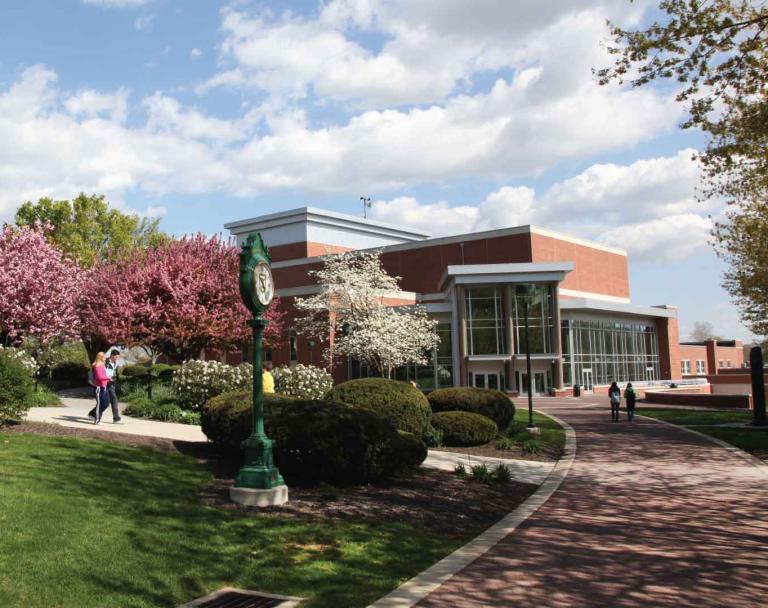Task force at York College working to make a more sustainable campus

- News and Events
- News Stories
Task force at York College working to make a more sustainable campus
January 26, 2021Recycle. Reuse. Reduce. Renewable sources of energy. Sustainability is becoming increasingly more important to an ever evolving and changing world, and at York College of Pennsylvania a task force is working diligently to make campus sustainability in York a reality. Dr. Pamela Gunter-Smith, President of YCP, formed the President’s Task Force on Campus Sustainability (PTFCS) constituted by representatives from the student body, faculty, and staff.
The 1987 Brundtland report (“Our Common Future”) by the United Nations defines sustainability as “sustainable development is development that meets the needs of the present without compromising the ability of future generations to meet their own needs.”
Sustainability in higher education
Jennifer Pomeroy, PhD, Chair of the PTFCS and Assistant Professor of Geography, says that “although there is no universal definition of sustainability, today, sustainability is largely seen as an integration and process(es) of three pillars: the environment, the economy, and society/culture. That is, sustainability must have environmental stability, economic viability, and social/cultural equity and justice.” And, institutions of higher education are the ideal location to model and lead the charge in a sustainable future.
“In order to achieve the goal of a sustainable world, leadership, civic engagement, and responsibility are the key,” says Pomeroy. “Universities and colleges are the key to an equitable and ecologically sound future through faculty’s expertise, curriculum, research, and activities with its surrounding communities.” Founded in December 2005, the Association for the Advancement of Sustainability in Higher Education (AASHE) is the leading organization helping universities and colleges by supporting the advancement of sustainability. The College became a member of AASHE in March 2020 and more recently this fall a member of the Pennsylvania Environmental Resource Consortium (PERC) to better connect and collaborate with other Pennsylvania schools sharing knowledge about sustainability research and best practices.
Advancements on campus
In the last year, the PTFCS has been working to create programming on campus to educate the YCP community and raise awareness of the importance to our campus “ecosystem.” Several events such as a Sustainability Workshop (originally scheduled for March 2020), TED talks, Recycling Unneeded, etc., were planned, but were postponed due to the pandemic. “Despite the interruption,” says Pomeroy, “faculty in several courses continued their sustainability projects.” The Psychology and Sustainability class with Perri Druen, PhD, Associate Professor of Psychology, took on several student initiatives including a scavenger hunt, a campus intervention project, sustainable eating, shuttle use, and reducing waste. Pomeroy’s students in Advanced Geographic Information Systems, and the students in the Ecological Action class taught by Bridgette Hagerty, PhD, and Jessica Nolan, PhD, Associate Professors of Biology, performed a stream assessment on Tyler Run Creek’s campus section.
“We’re a decent sized area in population so we do create a lot of waste,” says Calvin Stein, a sophomore Biology major and member of the PTFCS and Spartans for Sustainability club. “Since it is a college, the students are here to learn and experience new ideas. This is a great way to reach individuals and get them started on following a sustainable path.”
How campus can help
“Campus sustainability can only be achieved by involving all campus communities. Students are central to our efforts, but staff, faculty, administrators, even alumni can play a key role,” says Pomeroy. The campus community can get involved by taking simple steps to help reduce energy use: recycling, reduce the waste, conducting energy audits, and participating in programs that educate on sustainability. Students can get involved in the Spartans for Sustainability club and become more involved in campus sustainability activities.
Pomeroy also suggests that “students should talk to professors about sustainability related research and projects to further explore their perspectives.” As for the PTFCS, they are looking forward to 2021 for the Campus Sustainability Bi-Week Campaign which will take place April 19-30. During these two weeks, activities and awareness initiatives—especially for Earth Day on April 22 and Pennsylvania’s Arbor Day on April 30—will be planned on campus to help get the word out on the importance of campus sustainability and what the community can do to get involved.
For more information on AASHE and campus sustainability, please visit www.aashe.org. For more information on PERC and Pennsylvania’s green colleges, please visit www.pagreencolleges.org.
News Stories View all News Stories
